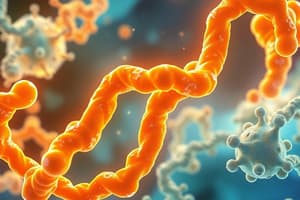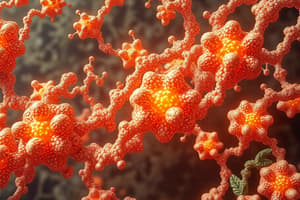Podcast
Questions and Answers
What determines the equilibrium between S and P in the absence of the enzyme?
What determines the equilibrium between S and P in the absence of the enzyme?
- Interaction between the enzyme and substrate
- Presence of the appropriate enzyme
- Total energy changes during the conversion of S to P
- Ratio of the forward and reverse reaction rates (correct)
What effect does the enzyme have on the equilibrium between S and P?
What effect does the enzyme have on the equilibrium between S and P?
- Reduces the rate of the forward reaction
- Unaltered equilibrium state (correct)
- Shifts the equilibrium towards P
- Increases the concentration of S
What is the role of the transition state in enzyme-catalyzed reactions?
What is the role of the transition state in enzyme-catalyzed reactions?
- Facilitates conversion of substrate to product (correct)
- Energy required to reach the highest energy state
- Determines the final energy states of S and P
- Forms a barrier to reaction progress
How do enzymes increase the rate of reaction in both forward and reverse directions?
How do enzymes increase the rate of reaction in both forward and reverse directions?
What characterizes the active site of an enzyme?
What characterizes the active site of an enzyme?
What is the central role of enzymes as biological catalysts?
What is the central role of enzymes as biological catalysts?
Why are most biological reactions catalyzed by proteins?
Why are most biological reactions catalyzed by proteins?
How do enzymes affect the rates of biochemical reactions?
How do enzymes affect the rates of biochemical reactions?
What happens to biochemical reactions without enzymatic catalysis?
What happens to biochemical reactions without enzymatic catalysis?
Why do cells contain thousands of different enzymes?
Why do cells contain thousands of different enzymes?




